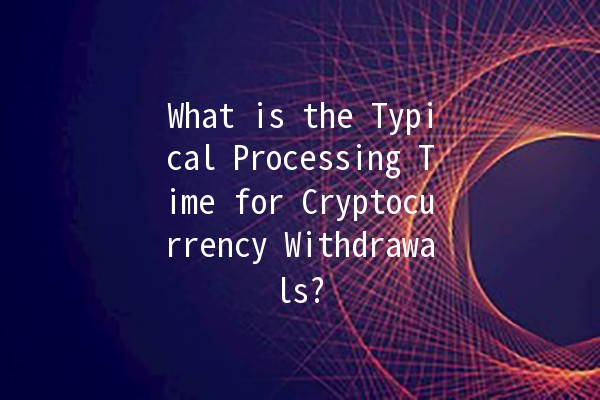




Cryptocurrency enthusiasts often find themselves questioning various aspects of handling their digital assets, one of the most common being the processing time associated with withdrawals. As cryptocurrencies continue to grow in popularity, understanding the nuances of transaction times becomes essential for users looking to manage their portfolios effectively. In this article, we will delve into the typical processing time for cryptocurrency withdrawals and discuss several productivity techniques you can implement to streamline your crypto experience.
The process of withdrawing cryptocurrency is relatively straightforward, but the time it takes for the transaction to be processed can vary significantly based on several factors. By comprehending how these factors influence processing times, users can make informed decisions regarding their transactions.

The typical processing time for cryptocurrency withdrawals varies based on the factors discussed above but generally falls within specific ranges for common cryptocurrencies:
Bitcoin: 10 minutes to 1 hour, depending on network congestion and fees set by the user.
Ethereum: 15 seconds to 2 minutes, contingent on network activity.
Litecoin: Approximately 2.5 minutes.
Ripple (XRP): Usually processed in under a minute.
Dogecoin: Similar to Litecoin, around 1 minute.
Setting up withdrawal alerts on your cryptocurrency exchange can help you track the status of your transactions in realtime. Most exchanges offer notifications via email or SMS. This practice keeps you informed and reduces anxiety while waiting for transactions to process.
If you set up withdrawal alerts, you’ll receive a notification instantly once your withdrawal has been initiated and again once it's completed. This technique allows you to manage your time better without constantly checking the exchange.
If you plan on withdrawing significant amounts of cryptocurrency, consider breaking them into smaller transactions. This approach might minimize the risk of delays associated with larger sums, which may be subjected to additional verification.
Instead of withdrawing 5 BTC at once, consider withdrawing 1 BTC several times. This can often streamline the process, as each smaller transaction may be processed faster and with less scrutiny.
When the blockchain network is experiencing high traffic, consider opting for higher transaction fees to prioritize your withdrawal. Many exchanges allow users to adjust transaction fees, and selecting a higher fee can lead to quicker confirmation.
If the Bitcoin network is congested and you select a transaction fee of $5 instead of $1, your transaction is more likely to be processed faster, getting your funds into your wallet sooner.
Ensure that your identity verification on the exchange is uptodate. Many exchanges conduct routine checks or may require additional verification for withdrawals, especially for unverified accounts. Keeping your account updated can reduce processing times significantly.
If you’ve changed your address or bank account linked to the exchange, make sure to update this information promptly to avoid unnecessary delays during the withdrawal process.
Understanding market conditions and their impact on cryptocurrency transactions can prepare you for potential delays. Keeping an eye on major crypto news can help you time your transactions better, especially when predicting highvolume trading periods.
If news breaks about an important market event, waiting for the initial rush to subside before making a withdrawal could lead to much faster processing times.
Bitcoin withdrawals generally take between 10 minutes to 1 hour, affected by network congestion and transaction fees chosen by the user.
Yes, you can speed up your withdrawal by selecting a higher transaction fee, which can lead to quicker processing by incentivizing miners.
If your withdrawal is delayed, first check the status on the exchange. If it's taking significantly longer than the typical times, consider contacting customer support for assistance.
Yes, potential risks include security concerns, withdrawal limits imposed by exchanges, and delays due to verification requirements. It's essential to use reputable exchanges and keep your security practices uptodate.
Exchanges may hold withdrawals for extended periods to conduct security checks, especially for firsttime or large transactions. This is a common practice aimed at preventing fraud.
Usually, if a cryptocurrency withdrawal fails, the funds will be returned to your exchange account. Always verify your transaction details to minimize the chances of failure.
The world of cryptocurrency is everevolving; staying informed is crucial. While the principles discussed here are generally applicable, it's essential to remain adaptable to changes in network conditions, exchange policies, and market dynamics. By applying the productivity techniques highlighted above, you can better manage your cryptocurrency withdrawals, ensuring a smoother experience that aligns with your trading and investment strategies. Happy trading!